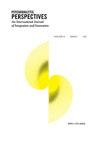A Psychoanalytic Foundation for Modern Ethics
Q4 Psychology
引用次数: 0
Abstract
It is argued that the contemporary psychoanalytic concept of the self provides a foundation for a modern ethic. The self is founded on the empathic recognition by the other who is seen as a subject in her own right. Therefore, the authentic self that realizes its potential is inherently empathic. But those who do not grow up in an empathic environment do not develop the capacity for empathy toward others or themselves and are likely to commit unethical acts. It is argued that the causation is also reversed. Those who commit unethical acts inflict damage upon the self, just as damaged selves are likely to become unethical. The need to disavow the ethical transgression leads to splitting and a weakened self. Without the experience of being empathized with by an other seen as a subject, the subjectivity of the self is arrested and becomes objectified. So, the foundation of ethics for the Western World may be found in the very sense of self. This may be called an ethic of inclination, as opposed to an ethic of imposition. The self who is free to pursue its authentic desires and goals will be ethical in pursuit of its destiny. In this ethic, the other’s subjectivity is recognized and appreciated for what it is even if the other is an opponent or enemy. The source of ethical behavior is self-realization.现代伦理学的精神分析基础
有人认为,当代精神分析的自我概念为现代伦理提供了基础。自我是建立在被视为自身主体的另一方的移情认知之上的。因此,真正的自我意识到它的潜力是内在的移情。但是,那些没有在移情环境中长大的人没有培养出对他人或自己的移情能力,很可能会做出不道德的行为。有人认为因果关系也是颠倒的。那些做出不道德行为的人会对自己造成伤害,就像受损的自己很可能变得不道德一样。否认违反道德的需要会导致分裂和自我削弱。如果没有被另一个被视为主体的人移情的体验,自我的主体性就会被束缚并被物化。因此,西方世界伦理的基础可以在自我意识中找到。这可以被称为倾向的伦理,而不是强加的伦理。自由追求其真实欲望和目标的自我,在追求其命运时将是合乎道德的。在这种伦理中,即使对方是对手或敌人,也会承认和欣赏对方的主体性。道德行为的来源是自我实现。
本文章由计算机程序翻译,如有差异,请以英文原文为准。
求助全文
约1分钟内获得全文
求助全文

 求助内容:
求助内容: 应助结果提醒方式:
应助结果提醒方式:


